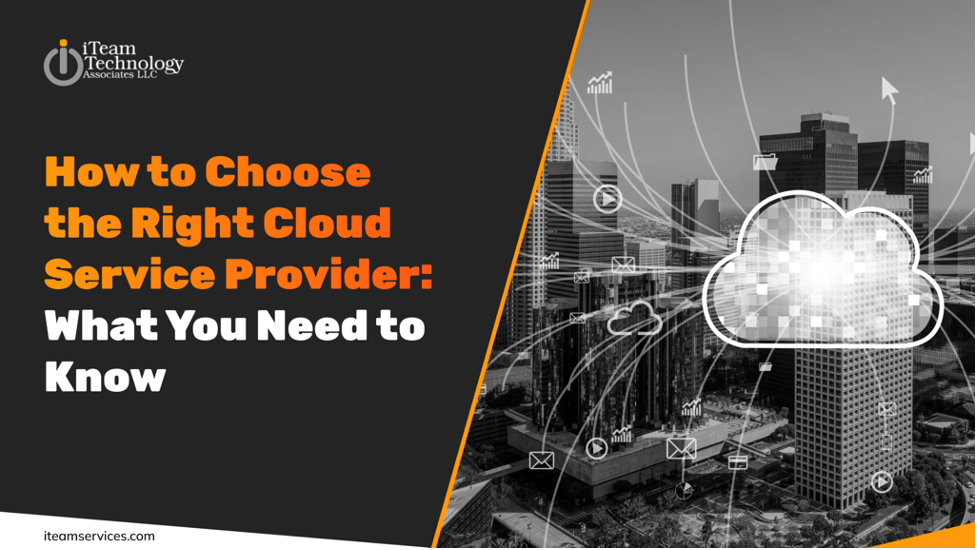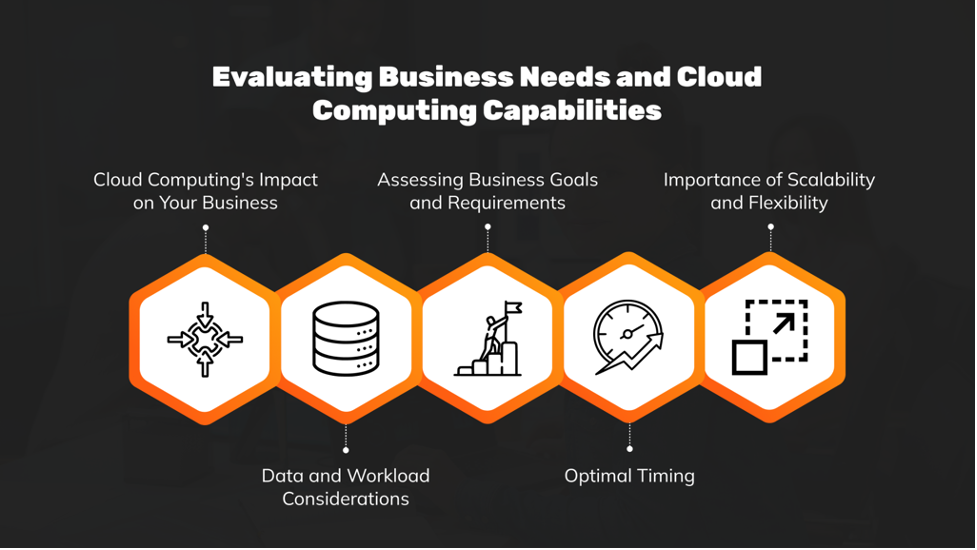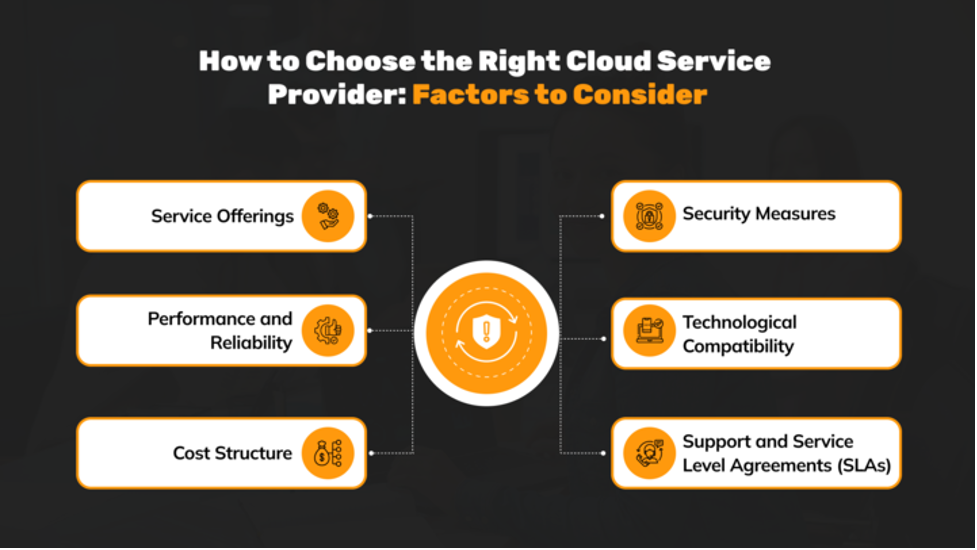
The global cloud computing market is expected to reach USD 1266.4 billion by 2028, growing at a compound annual growth rate (CAGR) of 15.1% from 2023 to 2028. This rapid expansion not only opens up opportunities but also introduces a set of unique challenges. Thoughtfully selecting a cloud provider is essential, as it positions your business for scalable growth and robust security in the growing market.
When choosing a cloud service provider, your business might face several challenges:
- You will notice that while every provider promises excellent performance, the results can vary significantly.
- Integrating the latest technology is essential for staying competitive.
- Given the rise in cyber threats, selecting a provider with robust security measures is non-negotiable.
- As technologies evolve, the level of support your cloud service provides can make a significant difference.
Awareness of these challenges is essential as we explore how to make an informed, strategic choice for a cloud service provider that aligns with your business objectives and enhances your operational capabilities. This blog will explore the essential considerations to help you navigate this decision.
Evaluating Business Needs and Cloud Computing Capabilities

Before discussing the specifics of selecting a cloud service provider, it's essential to understand how cloud computing can transform business operations.
Cloud Computing's Impact on Your Business
Cloud computing offers scalable, on-demand resources that significantly enhance operational efficiency, increase scalability, and improve data accessibility. Moving to the cloud allows your business to utilize powerful computing resources without substantial upfront investments in physical infrastructure.
Data and Workload Considerations
Evaluating your data and workload requirements is pivotal in selecting the right cloud provider. Consider:
- What are your specific data storage needs?
- How critical are your processing and retrieval speeds?
- What are your peak load times, and how should your cloud service manage these?
- Which business applications will you be moving to the cloud and what are their operational requirements?
Additionally, it's essential to account for data security requirements and compliance with relevant regulations, mainly if you handle sensitive or personal data. Choose a cloud provider with robust security measures in place, one that complies with industry standards and regulations relevant to your business.
Assessing Business Goals and Requirements
When considering a move to the cloud, start with a clear assessment of your business goals and requirements. Think about what you aim to achieve:
- Are you looking to enhance operational efficiency?
- Is increasing scalability a priority as your business grows?
- Do you need to improve data accessibility for remote teams?
- Does a full cloud or hybrid cloud solution best meet your operational requirements?
Understanding these objectives is crucial as they will guide your decision-making process in choosing the right cloud service provider.
Optimal Timing
Once you've established clear criteria based on technical, service, security, data governance, and service management needs, you can better evaluate your selected group of potential providers. This clarity is crucial as it enables you to ask the right questions and gauge each provider’s ability to meet your specific requirements.
Importance of Scalability and Flexibility
Scalability and flexibility are vital considerations in cloud computing. As your business expands, the need for additional resources will likely increase. Opting for a cloud provider that offers scalable services means they can accommodate growth without a significant overhaul of your existing setup. Flexibility is equally important, ensuring that cloud services can adapt to your business’s evolving needs—whether that involves scaling resources up or down or smoothly integrating new technologies.
Moreover, when migrating applications and workloads to the cloud, consider the environments and services your potential providers offer. These factors will influence the necessary configurations, the extent of work required on your part, and the level of support you can expect from the provider during the migration.
Ideally, you should finalize your choice of cloud service providers after identifying which applications and workloads will be migrated concurrently with analyzing and preparing these workloads for migration. This timing ensures that you choose a provider that fits your current business needs and is well-equipped to support your migration and future growth.
By methodically evaluating these aspects, you will be better equipped to select a cloud service provider that meets your current needs and supports your business's future growth and evolution.
How to Choose the Right Cloud Service Provider: Factors to Consider

Choosing the right cloud service provider is essential for businesses utilizing technology for growth and innovation. Below, we will discuss the important factors to consider as you evaluate different providers to find one that aligns with your business needs.
Service Offerings
When selecting a cloud service provider, aligning their offerings with your organization's needs is crucial. Providers vary significantly in the services they offer, such as Infrastructure as a Service (IaaS), Platform as a Service (PaaS), and Software as a Service (SaaS).
| Service Type | Description |
| IaaS (Infrastructure as a Service) | Rent physical or virtual servers, storage, and networking infrastructure. Suitable for hosting applications and managing large datasets while maintaining control over environments. |
| PaaS (Platform as a Service) | Provides a development platform for building and deploying applications. It includes data storage and processing tools, eliminating the need to manage underlying hardware or software layers. |
| SaaS (Software as a Service) | Uses software applications hosted and managed by the provider that are accessible over the Internet. It is ideal for those who prefer not to manage infrastructure or platforms and enjoy automatic updates and security enhancements. |
When evaluating potential providers, inquire about their service development roadmap. You need to understand how they plan to innovate and expand their services. Determine if their plans align with your long-term needs. Important considerations include:
- Technology Commitments: Are they committed to specific technologies or vendors that match your preferences?
- Interoperability: How well do their services integrate with other systems? This is crucial if you plan to maintain a hybrid environment.
- Proven Track Record: Can they demonstrate success in deployments similar to your plan?
Your overall cloud strategy should guide your choice:
- If you prefer a multi-vendor approach, the breadth of a provider's service portfolio may be less critical.
- Conversely, if you rely on a few key providers, choose those offering a comprehensive range of compatible services that meet all your anticipated needs.
Security Measures
When evaluating a cloud service provider, scrutinize its security measures to ensure they align with your organization's data protection standards.
Certifications
Look for providers that hold reputable certifications, such as ISO 27001, which indicates they adhere to stringent security management standards. Additionally, inquire about industry-specific certifications relevant to your sector, like HIPAA for healthcare or PCI DSS for payment data.
Data Protection Policies
Examine the provider’s data protection and privacy policies. Check how data is encrypted, both at rest and in transit. A reliable provider should use advanced encryption standards such as AES-256. It’s also worth asking about their data retention and deletion policies to ensure compliance with data protection regulations like GDPR.
Compliance is critical, mainly if your organization operates under specific regulatory frameworks. A cloud service provider should comply with general regulations such as GDPR or CCPA and any industry-specific legislation affecting your business.
Understanding the legal implications of storing your data with a cloud provider, including where it is geographically stored, is essential. Data sovereignty laws can affect how data is handled across borders. Therefore, confirm that the provider can comply with the laws of the countries where your data will be stored and accessed.
Performance and Reliability
Uptime guarantees often quantify performance, with leading providers offering 99.99% uptime SLAs. This equates to less than an hour of downtime per year. High availability is crucial for critical operations, so these guarantees should be a major factor in your decision.
Evaluate the provider’s network architecture to ensure it can deliver the low latency required for your applications. Proximity to data centers can affect latency, so consider a provider with data centers near your key user bases.
Strong disaster recovery solutions are essential. Ask providers about their disaster recovery options, including RTO (Recovery Time Objective) and RPO (Recovery Point Objective) metrics. These indicators will help you understand how quickly the service can be restored after a disruption and how much data might be lost in such events.
Technological Compatibility
When choosing a cloud service provider (CSP), assess its ability to integrate seamlessly with your existing systems. This compatibility minimizes disruptions and leverages your current technological investments. Providers should offer APIs and other integration tools compatible with your existing software, ensuring a smooth transition and continuous operation.
Consider whether the CSP is committed to innovation and staying ahead of technology curves. They should continuously update their services with the latest technologies and offer solutions that can adapt to emerging trends. This foresight ensures that your infrastructure will not become obsolete and can support new business initiatives as they arise.
Cost Structure
Cloud service providers typically offer various pricing models, such as
- Pay-as-you-go,
- Subscription-based or
- Tiered pricing structures.
Each has its advantages, depending on your usage patterns and budgetary constraints. Be vigilant about hidden costs, including data transfer fees, additional charges for premium support services, and costs associated with data storage or additional security features. Transparency in pricing is crucial to avoid unexpected expenditures.
Conduct a thorough cost-efficiency analysis to compare cloud solutions' total cost of ownership (TCO) versus on-premise solutions. This analysis should factor in direct costs (like subscription fees) and indirect costs (like operational and maintenance expenses).
Support and Service Level Agreements (SLAs)
The provider's support structure should be robust, with multiple support channels like live chat, email, and phone. Availability around the clock is crucial, especially for businesses operating in multiple time zones or with critical operations.
SLAs are pivotal in defining the expected service quality and availability. Key components of an effective SLA include:
- Service Level Objectives (SLOs): These should cover critical performance metrics like uptime (typically expressed as a percentage, e.g., 99.99%), response times, and capacity limits.
- Remediation Policies and Penalties/Incentives: SLAs should clearly outline consequences for service lapses, including specific penalties or compensatory measures.
- Exclusions and Caveats: Understand the conditions under which the SLA does not apply, such as during planned maintenance or in cases of major external disruptions.
Despite the complexity often found in SLA documents, efforts such as the ISO/IEC 19086-1:2016 provide frameworks that help understand terms and create a more standardized evaluation. This standard encourages clarity, measurability, and relevance in drafting SLAs.
The Strategic Advantage of Choosing a Specialized Cloud Service Provider
Choosing the right cloud service provider is crucial for businesses looking to optimize their operations and enhance security without incurring unnecessary costs. Partnering with a specialized provider offers cloud migration managed by experts, allowing your team to focus on core business functions while efficiently handling the technical aspects.
This partnership ensures cost-effectiveness as you only pay for the resources you use, providing flexibility and reducing overall IT expenses. Additionally, advanced cybersecurity measures and automated compliance systems protect your data and simplify regulatory adherence, making it easier to meet industry standards without the hassle.
Selecting a cloud provider like iTeam Technology Associates supports your business's growth through customized cloud solutions that align with your goals and adapt to future technological developments.
Discover iTeam Technology Associates' Proactive Cloud Solutions for Every Business Need

iTeam Technology Associates offers customized cloud solutions that align precisely with your business needs. From streamlined cloud migrations to secure data management, our cloud services optimize and safeguard your IT infrastructure. Here’s what we offer:
- Custom Cloud Migration Strategies
- Flexible Cloud Solutions
- 24/7/365 Cloud Monitoring & Maintenance
- Cost-Effective Cloud Architecture
- Advanced Compliance Tools
- Robust Cybersecurity Measures
Whether you need cloud backup, high-security computing, or compliance-focused cloud infrastructure, iTeam Technology Associates delivers reliable, proactive cloud solutions to drive your business forward. Discover how our cloud services can support your growth and protect your data.



